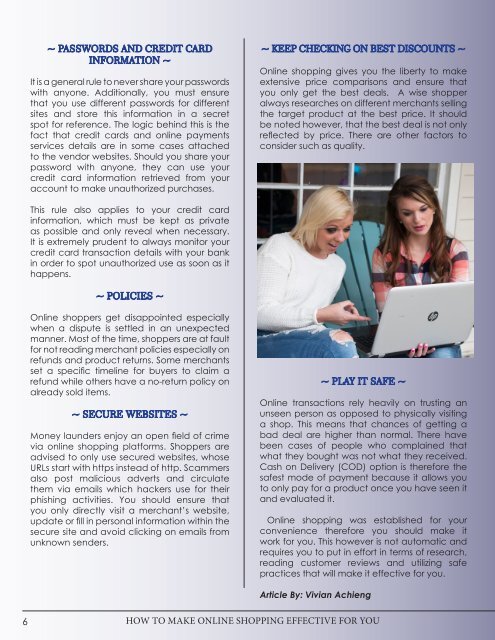UR IT Magazine February 2016
Create successful ePaper yourself
Turn your PDF publications into a flip-book with our unique Google optimized e-Paper software.
~ PASSWORDS AND CRED<strong>IT</strong> CARD<br />
INFORMATION ~<br />
It is a general rule to never share your passwords<br />
with anyone. Additionally, you must ensure<br />
that you use different passwords for different<br />
sites and store this information in a secret<br />
spot for reference. The logic behind this is the<br />
fact that credit cards and online payments<br />
services details are in some cases attached<br />
to the vendor websites. Should you share your<br />
password with anyone, they can use your<br />
credit card information retrieved from your<br />
account to make unauthorized purchases.<br />
~ KEEP CHECKING ON BEST DISCOUNTS ~<br />
Online shopping gives you the liberty to make<br />
extensive price comparisons and ensure that<br />
you only get the best deals. A wise shopper<br />
always researches on different merchants selling<br />
the target product at the best price. It should<br />
be noted however, that the best deal is not only<br />
reflected by price. There are other factors to<br />
consider such as quality.<br />
This rule also applies to your credit card<br />
information, which must be kept as private<br />
as possible and only reveal when necessary.<br />
It is extremely prudent to always monitor your<br />
credit card transaction details with your bank<br />
in order to spot unauthorized use as soon as it<br />
happens.<br />
~ POLICIES ~<br />
Online shoppers get disappointed especially<br />
when a dispute is settled in an unexpected<br />
manner. Most of the time, shoppers are at fault<br />
for not reading merchant policies especially on<br />
refunds and product returns. Some merchants<br />
set a specific timeline for buyers to claim a<br />
refund while others have a no-return policy on<br />
already sold items.<br />
~ SEC<strong>UR</strong>E WEBS<strong>IT</strong>ES ~<br />
Money launders enjoy an open field of crime<br />
via online shopping platforms. Shoppers are<br />
advised to only use secured websites, whose<br />
<strong>UR</strong>Ls start with https instead of http. Scammers<br />
also post malicious adverts and circulate<br />
them via emails which hackers use for their<br />
phishing activities. You should ensure that<br />
you only directly visit a merchant’s website,<br />
update or fill in personal information within the<br />
secure site and avoid clicking on emails from<br />
unknown senders.<br />
~ PLAY <strong>IT</strong> SAFE ~<br />
Online transactions rely heavily on trusting an<br />
unseen person as opposed to physically visiting<br />
a shop. This means that chances of getting a<br />
bad deal are higher than normal. There have<br />
been cases of people who complained that<br />
what they bought was not what they received.<br />
Cash on Delivery (COD) option is therefore the<br />
safest mode of payment because it allows you<br />
to only pay for a product once you have seen it<br />
and evaluated it.<br />
Online shopping was established for your<br />
convenience therefore you should make it<br />
work for you. This however is not automatic and<br />
requires you to put in effort in terms of research,<br />
reading customer reviews and utilizing safe<br />
practices that will make it effective for you.<br />
Article By: Vivian Achieng<br />
66<br />
HOW TO MAKE ONLINE FASHION SHOPPING PROMOEFFECTIVE FOR YOU<br />
7

















